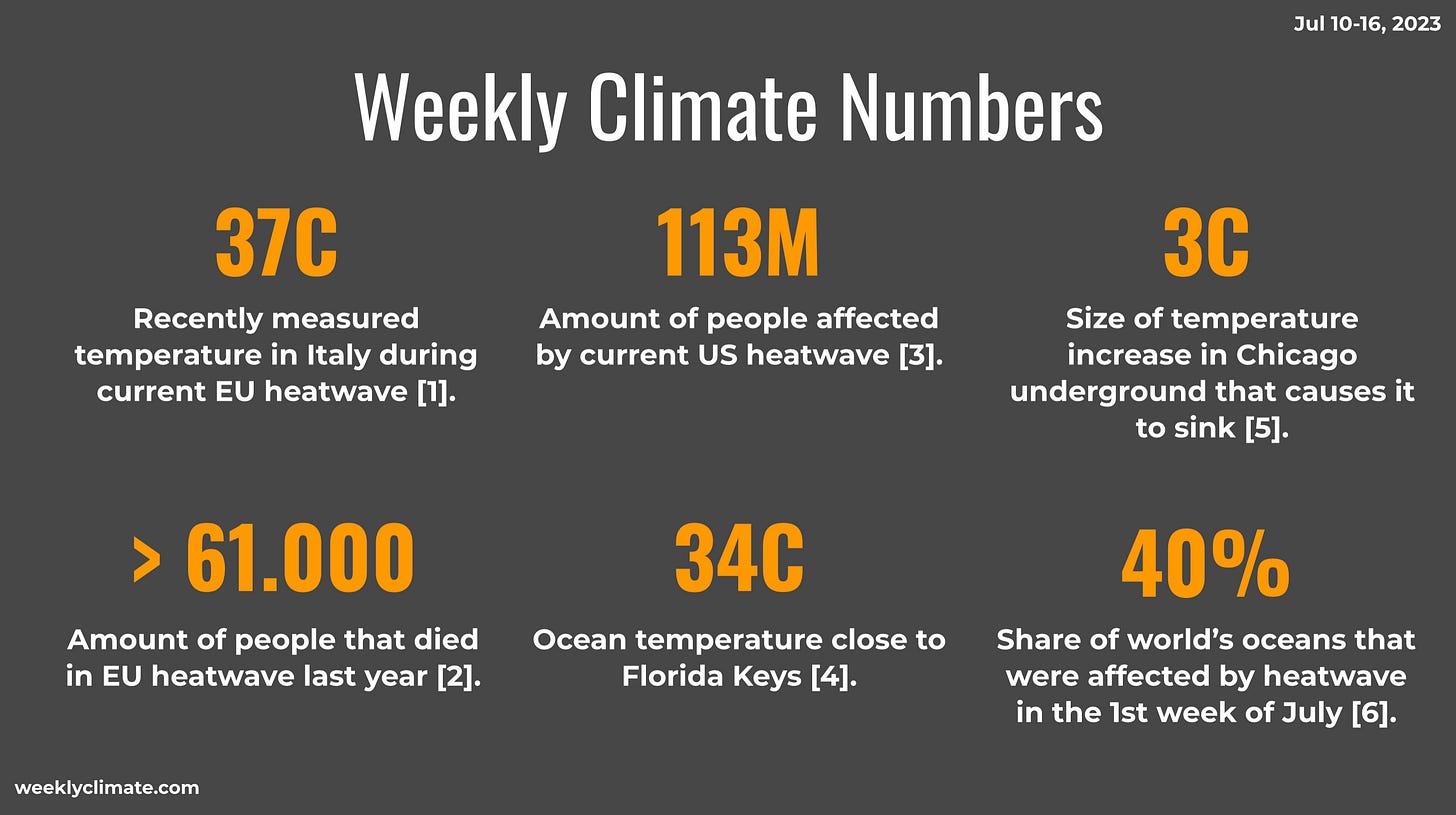[July 10-16’23] The hot issue 🔥
July week 1 likely hottest ever, renewables so cheap fossil peak might have been reached, droughts increase fossil fuel emissions and even tiny fossil gas leaks makes it worse than coal.
Welcome to this week’s edition of The Weekly Climate 🎉
References: [1], [2], [3], [4], [5] and [6].
Lots of articles about all the heatwave and heat related issues this week. Most of these articles are in the Climate & Science section and Adaptation section. Enjoy your week!
‼️News you can’t miss
Here’s one important scary/bad (🙀), good (😻), interesting (😼) and fossil (💩) news item.
🙀 1st week of July likely to be the hottest ever recorded
😻 Renewables are so cheap that fossil fuels might have peaked for electricity production
😼 New study finds that droughts increases fossil fuel emissions (due to lack of hydro)
💩 New study finds that even tiny leaks in fossil gas infrastructure can make fossil gas as bad as coal
👩⚕️ Status: Climate & Science
Let’s look at how we’re doing this week!
[#hottestweek] — Preliminary data from the World Meteorological Organization shows that the first week of July 2023 was the hottest week ever recorded, following the hottest June on record. Extreme weather events, such as flooding in the northeastern United States, India, and Japan, and a marine heat wave affecting 40% of the world's oceans, are linked to climate change and the global El Niño weather phenomenon. Experts predict that the summer will continue to be rattled by storms and soaring temperatures, and warn that delaying a transition away from fossil fuels could lead to catastrophic consequences.
[#heatwaves] — Heat waves around the world are happening more frequently and reaching higher temperatures because of climate change. Attribution scientists can determine the role that climate change played in its intensification. With extreme heat in particular, scientists are now comfortable assuming that all heat waves are being made more severe or likely because of climate change. As heat waves worsen, so too does the sense of dread they bring to vulnerable populations.
[#crawfordlake] — Scientists have chosen Crawford Lake in Ontario as a potential marker for the start of the Anthropocene epoch, a new interval of geologic time that could soon be recognized alongside other periods of planetary change. The lake was selected over 11 other candidates for containing the clearest evidence of humankind's influence on the global geologic record, including changes in plutonium and radiocarbon from nuclear detonations and fly ash from burning fossil fuels. The final ruling on the Anthropocene will dictate nomenclature used in academic studies, textbooks, and museums for generations to come, and help shape humanity's understanding of its place on Earth.
📰 The 7 Grand Challenges
⚡️Decarbonize Electricity
Clean electricity is the one do-or-die challenge we must solve.
[#fossilfuelpeak] — Renewable energy's exponential growth is driving down global electricity prices and making fossil fuels uneconomical, leading to a decline in gas, oil, and coal linked to electricity generation, according to a report by the Rocky Mountain Institute. The report predicts that solar panels and wind turbines will supply more than a third of global electricity by 2030, compared to about 12% today, with renewables producing as much as 14,000 terawatt-hours, overtaking fossil fuels. The increasing adaptation of clean-tech is set to halve its prices by 2030, falling to as low as $20 a megawatt-hour for solar from $40-plus now, the report said.



